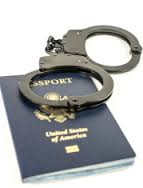Criminal justice visas – what you need to know
What if you or someone you know who is here on a study or work visa gets charged with a crime? Will they automatically be deported to their country of origin or will they lawfully be able to stay in Australia once his or her visa expires to fight the case?
Normally a non-Australian citizen who commits a crime will be deported from Australia right away. However, non-citizens can be kept in Australia temporarily for criminal justice purposes if the police apply for a criminal justice visa.
A criminal justice visa not only can prevent a non-Australian citizen suspected of a crime from leaving the country, it also can apply to complainants and witnesses as well.
A non-citizen is allowed to remain in Australia temporarily for criminal justice purposes under a criminal justice visa, according to the SECT 161 of the MIGRATION ACT 1958.
Rather than incarceration in a Detention Centre awaiting Trial or the finalisation of their criminal proceedings, Criminal Justice Visas are a means for accused persons to remain free within the community whilst on bail.
Criminal Justice Entry Visa
A ‘criminal justice entry visa’ is a visa class that gives permission for non-Australian citizens to travel to, enter and remain in Australia while the visa is in effect. Non-citizens under this visa class are not prevented from leaving Australia.
A criminal justice visa entitles a non-Australian citizen to be released if he or she is in immigration detention.
A criminal justice stay certificate must be issued before a criminal justice visa will be granted and only the Minister for Immigration has absolute discretion regarding the grant of a Criminal Justice Stay visa.
Criminal Justice Stay Visa
The ‘criminal justice stay visa’ is a visa class that allows a non-citizen who is already in Australia to say in the country for the purposes of the administration of criminal justice. It can be issued to the holder of the Bridging F visa or any other person with or without a valid visa, where that person decides to assist police and prosecutors (Source: TC Beirne School of Law).
Criminal Justice Visas are commonly used in serious criminal proceedings such as the importing of illicit drugs, money laundering or human trafficking cases where police need the victim or accused to remain in Australia while an investigation is under way.
If the criminal justice visa has been granted “for the purpose of assisting in the administration of criminal justice in relation to an offence of trafficking in persons, slavery or slavery‑like practices” the victim is eligible for a Special Benefit under 9.2.14 Visa Subclass ZB 951 Criminal Justice Stay Visa.
Holders of Criminal Justice Visas Not Permitted to Work
A condition of a criminal justice entry visa for a non-citizen, according to Section 160 of the ACT is that the “non-citizen must not do any work in Australia, whether for reward or otherwise.” This can be particularly troubling for victims who have been granted criminal justice visas to support authorities in their criminal cases because they may have no means to support themselves while the case is under investigation.
Take for example the case of Indian man Manjit Singh who was living in Australia on a criminal justice visa as a suspected victim of people trafficking. According to an article in the Sydney Morning Herald, Manjit had been brought here on a 457 visa to work at an Indian restaurant. During the investigation, he told authorities that he was required to “work from 8am until midnight, seven days a week and had to sleep in a storeroom that he was locked in overnight.” He also described having “only limited food available to eat and getting little in the way of breaks,” as well as having no access to a shower or bath, instead he was required to “bathe using a jug and the tap in the public toilet.”
As a result, Manjit’s health suffered under these conditions and in May 2009 he was admitted into hospital weighing only 52 kg with severe tuberculosis, malnutrition and anaemia.
After months of treatments, tests and being re-admitted into hospital various times over the next two years, including having his diseased right lung removed in August 2011, it was recorded in outpatient notes “that he had no money and was not able to feed himself or pay for housing.” On August 26, 2011, Manjit died from complications following the surgery.
The Coroner said in his report that “even while he was living in Australia on a criminal justice visa as a suspected victim of people trafficking while the Australian Federal Police conducted their investigations, Manjit had no right to work and therefore lived hand-to-mouth, relying on charity, but suffering from malnutrition and deteriorating physically so much that he became vulnerable to reactivation of his tuberculosis.”
Criminal justice visa are critical in cases of human trafficking because it gives victims a simple and accessible means to legalise their status temporarily or permanently and allows them to remain in the country lawfully while proceedings against their traffickers continue. Otherwise trafficking victims will be less likely to cooperate with authorities if they fear being deported.
“Subsistence Payments” can be made to holders of Criminal Justice Visas
In many circumstances an application can be made to DIMIA for payments to be made to the holder of a Criminal Justice Visa to support themselves during the time they are required to stay in Australia. Provided evidence can be produced of the need for support, and the lack of support from abroad in their home country, subsistence payments to the visa holder are often crucial to their continued stay in Australia.







